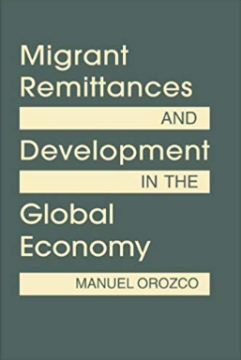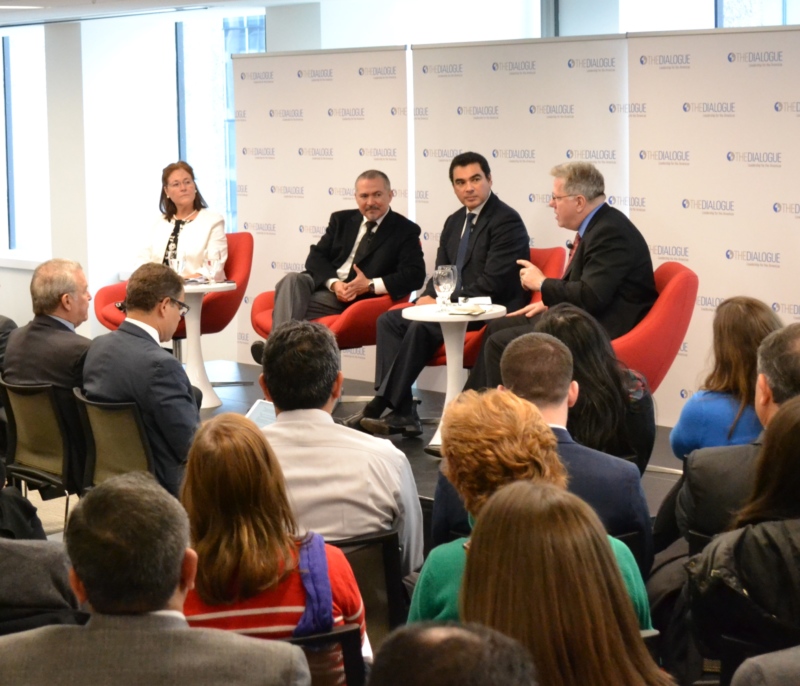
Migrant Remittances & Development in the Global Economy
How do patterns of migration and remittances differ across regions? What kinds of frameworks support the contributions of remittances to local development?
On Wednesday, February 14th the Inter-American Dialogue’s Migration, Remittances & Development Program hosted a panel discussion concerning the political, economic, and social implications of ending Temporary Protected Status (TPS) for Salvadorans. Moderated by the Director of the Program, Manuel Orozco, the panel included María Eugenia Brizuela de Ávila, Former Foreign Minister of El Salvador; Andrew Selee, President of the Migration Policy Institute; and Oscar Chacón, Executive Director of Alianza Americas. Through the discussion, the panelists considered the implications of ending TPS for a population of Salvadorans who have been living in the United States for up to two decades.
Andrew Selee began by discussing US immigration policies within a global context. The current administration’s approach is based on the support of a minority of Americans who feel negatively towards immigrants and TPS recipients, Selee argued. Selee also noted that deporting TPS holders would prove ineffective since many would either stay in the United States without papers or return to the United States illegally. As such, the result would be turning a legal and law-abiding labor force into an undocumented labor force.
El Salvador is currently moving into a democratic phase to combat violence, corruption and the displacement of labor but the country is not ready for a mass repatriation of TPS recipients - María Eugenia Brizuela de Ávila #EndofTPS pic.twitter.com/nwOn81Ys8e
— The Inter-American Dialogue (@The_Dialogue) February 14, 2018
Oscar Chacón complemented Selee’s comments by emphasizing the issue that TPS recipients cannot adjust their status after contributing to the economy and society of the United States for decades. Addressing the “toxicity” surrounding the migration rhetoric, Chacón reflected on the history of migration to the United States and pointed out that the “face” of migration has changed in the past 40 years with the large increase of Mexican and Central American immigrants. The concept of “temporary” for those receiving protected status has also not been clearly defined in a way that is agreed upon and understood by policy makers and those receiving this status. This is consistent with the lack of “a mechanism to [officially incorporate] the fact that these populations that have become part of our permanency, part of our ongoing reality,” Chacón said.
María Eugenia Brizuela de Ávila addressed the role that the Salvadoran private-sector can play in the TPS debate. The Salvadoran Foundation for Economic and Social Development (FUSADES) has been actively engaging with this issue in El Salvador to complement the work being done by international organizations, government, and other groups. The private sector in El Salvador recognizes that receiving hundreds of thousands of deportees as skilled laborers from the U.S. could be a “brain gain” for the country. However, the country’s economic and social fragility would make it difficult to incorporate the returnees. Currently, there are 500,000 unemployed people in El Salvador and the country was only able to create 3,000 new jobs in 2017, Brizuela de Ávila stated. The return of some 260,000 former TPS recipients would drastically increase the jobs deficit in the country. What’s more, Brizuela de Ávila added, these returnees would be targeted and vulnerable to gang extortion and violence.
The panelists agreed that ending TPS for migrant groups such as the Salvadorans and forcing hundreds of thousands of people to return to their country after nearly two decades of integration within the United States would have negative effects. As a mutual responsibility, it is crucial that the United States and El Salvador maintain an open dialogue and work together to create policies that benefit both countries. Moving forward, the panelists suggested working with a variety of social and political actors, including the private sector, in order to find constructive solutions.
How do patterns of migration and remittances differ across regions? What kinds of frameworks support the contributions of remittances to local development?
In 2014, remittances to Latin America and the Caribbean grew 4%, reaching at least $62.3 billion.
Given their close proximity to the United States, LAC countries are well-positioned to capitalize on the surplus of US gas exports and current buyer’s market.
 Irene Estefania Gonzalez / Inter-American Dialogue
Irene Estefania Gonzalez / Inter-American Dialogue

